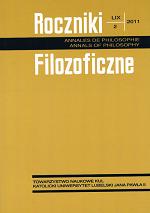Aksjologiczny wymiar pracy i odpoczynku w perspektywie ewolucyjnej
Axiological Dimension of Work and Rest in Evolutionary Perspective
Author(s): Marek SłomkaSubject(s): Philosophy
Published by: Towarzystwo Naukowe KUL & Katolicki Uniwersytet Lubelski Jana Pawła II
Keywords: work; rest; human evolution; Christian anthropology; culture
Summary/Abstract: It seems that work and rest are two fundamentally different ways of human functioning. When acting we believe we are needed and we can find meaning of live. Rest is rather referred to a passive attitude, when man doesn’t perform any operations but regenerates his physical or spiritual forces. These seemingly independent phenomena, however, can be regarded as two “sides of the same coin”. Christian teaching stresses that both of them represent the ways for human development and growth of the relation with God. By analogy, I want to show that in the context of reflection on human work it’s worth to present complementary cognitive perspectives. Contemporary knowledge about our evolutionary ancestors reveals the picture of hominids who acquired basic livelihoods by physical work. Nevertheless, individual efforts became gradually involved in social group’s existence. Moreover, human will to survive had been completed with the search of non-pragmatic aims of engagement when work generated basic questions concerning the meaning and value of human cooperation. Integral anthropological thought, therefore, demands not only analysis from the natural sciences point of view but also humanistic reflections on the unique status of man who creates culture and puts deep metaphysical questions.
Journal: Roczniki Filozoficzne
- Issue Year: 59/2011
- Issue No: 2
- Page Range: 43-51
- Page Count: 9
- Language: Polish

